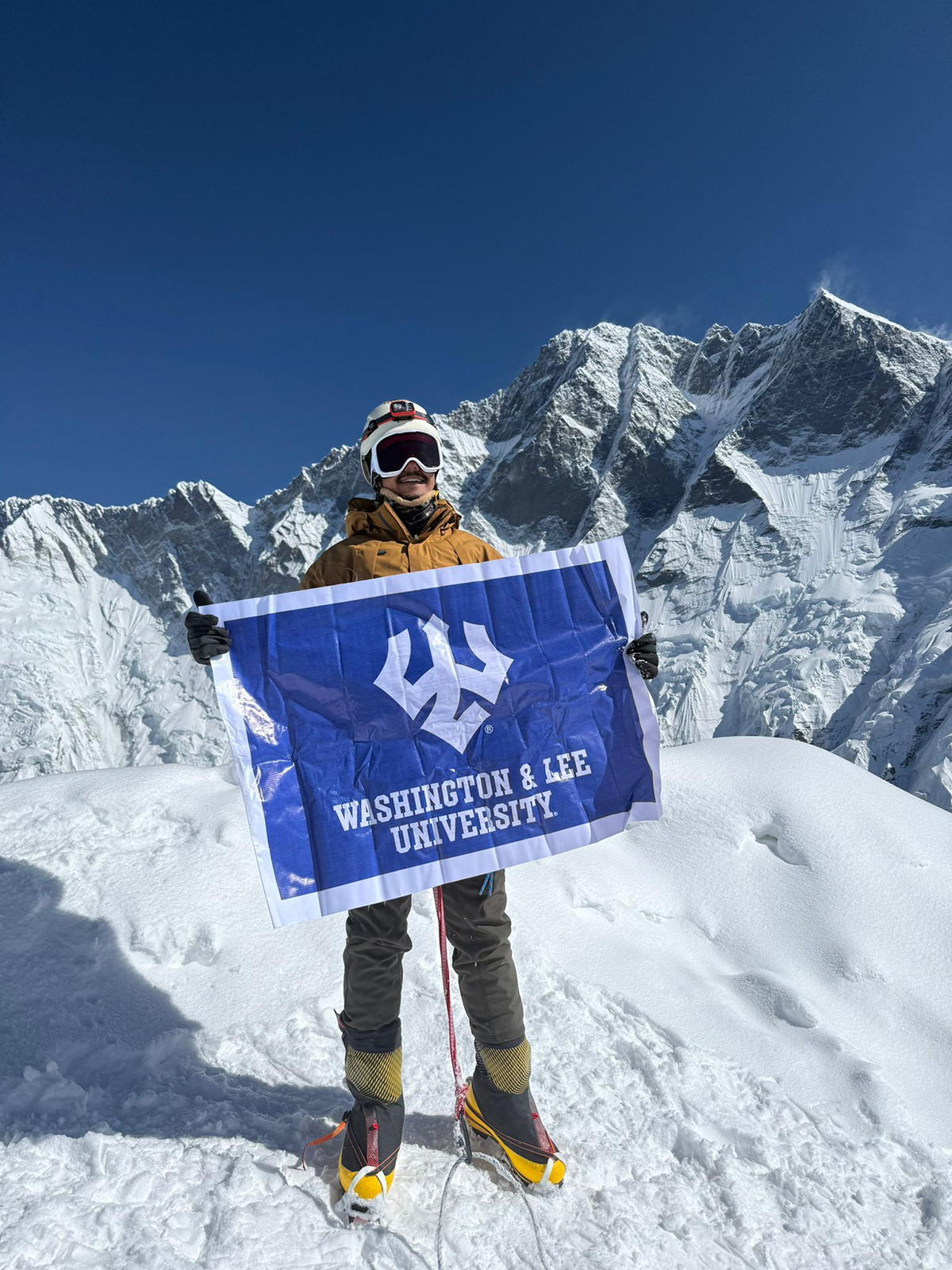
What the Mountain Gives You Chris Paudel ’28 set out to challenge himself — and cultural stereotypes — through a mountaineering expedition in his home country of Nepal.
“It’s my personal belief that you have to just accept what the mountain gives you.”
~ Chris Paudel ’28
When Chris Paudel ’28 stood atop the peak of Lobuche East in Nepal’s Khumbu region, tears freezing on his cheeks, he knew he had done more than summit a mountain. In just over three weeks, Paudel had climbed three Himalayan peaks without supplemental oxygen, enduring whiteouts, rock walls and brutal cold, and emerged with a message, not just of personal triumph, but of cultural change.
Paudel, a first-year student from Nepal, recently returned to his family home in Kathmandu after scaling Mera Peak (21,247 feet), Island Peak (20,305 feet) and Lobuche East (20,075 feet). His goal when he left campus on April 14 wasn’t fame or to set a world record. It was to rewrite a long-standing narrative within his homeland: that mountaineering is the domain of the Sherpa people alone.
Paudel grew up captivated by the mountains beyond Kathmandu. He remembers climbing to a neighbor’s rooftop terrace as a child to catch a glimpse of the snowcapped horizon. However, Paudel’s family belongs to the Brahmin caste. In Nepal’s traditional caste hierarchy, Brahmins are typically associated with intellectual, spiritual and political roles, and, Paudel says, it is unusual for those within his family’s social circles to seek out physically demanding activities like mountaineering. In contrast, the Sherpa people, an ethnic group native to the high Himalayas, have long been culturally and economically tied to physically demanding mountain work, including portering, guiding and climbing.
“My heart has just always been glued to the Himalayas,” Paudel says.
Paudel’s early love of the mountains deepened when he began volunteering in the Langtang region of Nepal during high school. There, he embarked on his first trek into the Himalayas and co-guided day hikes and multi-day treks alongside native Sherpa climbers. Paudel says he found his sense of purpose in mountaineering during a trek with a group from the United States. While Paudel was leading the group, he spent time walking alongside Sherpa climbers, carrying the same weight packs and sleeping in the same sleeping quarters as guides and porters, which is unusual for leaders or guests on the trips to do.
“We slept in a big room in our sleeping bags and cracked jokes all night,” Paudel says.
A moment during one of the group’s communal meals changed everything for him.
“Why do you guys accept me so happily?” he asked his Sherpa companions one evening. Their response, he says, set him on the path that led him to his recent expedition: “Because someone like you isn’t supposed to be here, carrying heavy loads, working with us, eating at the same table.”
It was then that Paudel realized that his passion was something that could challenge stereotypes. In a deeply caste-conscious country, the sight of a Brahmin working and climbing beside Sherpas challenged entrenched hierarchies and prejudices.
“I wanted to be a bridge,” he says, “to show Brahmins that mountaineering and Sherpas are not to be looked down upon, and that mountaineering is a sport for everyone, and Sherpas are veterans of that sport that we can learn from. I wanted to also show Sherpas that this is a new era, where we climb together and work together to introduce the Himalayas to the world.”
Paudel found institutional support for his dream at Washington and Lee through the Johnson Opportunity Grant, the Office of Inclusion and Engagement and the university’s Outing Club, which provided critical funding, gear and training, including technical experience Paudel gained from hours spent with the university’s climbing team. Paudel also conducted his own fundraiser and said he was touched by the outpouring of support from individual students, faculty and staff on campus. Initially, he intended to only summit Mera Peak. As he began to plan the logistics of his trip, he realized the three peaks, which are connected by one trail network, would represent an even more meaningful achievement.
Paudel set a goal for himself to summit all three peaks in as short an amount of time as the weather would allow and enlisted his friend Dawa Gyalzen Sherpa as his climbing partner, a seasoned mountaineer who has summitted Mount Everest seven times and several other 26,000-foot peaks. The challenges mounted quickly. The pair braved a whiteout at 20,000 feet on Mera Peak, during which they were briefly listed as missing persons. Their return trip down the mountain involved running a descent in 15 minutes that normally takes hours to escape worsening weather conditions. On Island Peak, the most demanding of the three, Paudel had just one day of good weather and had to push through a grueling 38-hour sprint from the trailhead to summit and back.
“At 6,000 meters [almost 20,000 feet], your lungs scream for oxygen,” he says. “I’d take ten steps, then gasp for air.”
His decision to climb without supplemental oxygen was deliberate.
“I wanted to earn the summit,” he says. “It’s my personal belief that you have to just accept what the mountain gives you.”
By the time he reached the base of Lobuche East, Paudel says his body was deteriorating. Still, he realized that he only had a one-day weather window to complete the last summit and knew he had to push forward. Paudel remembers dangling precariously from an ascender on a nearly vertical ice wall, exhausted and freezing, and asking his climbing partner what lay at the top.
“The summit,” was the simple reply.
In that moment, Paudel says he remembered his family, friends and everyone at W&L who had wished him well and supported him on his journey. He remembers clenching his rope, shouting, “Jai Gorkha!” (a patriotic rallying cry) and propelling himself to the top with all the energy he had left. When he reached the summit, tears streamed down his face — and almost immediately turned to ice.
“That was the moment I knew my purpose had been fulfilled,” he says. His partner, smiling, told him, “From today, you are Sherpa.”
Paudel is now home with his family, recuperating from his marathon trekking adventure. This summer, he wants to set a world record for the fastest ascent of Shivapuri, an 8,963-foot mountain peak. Afterward, he plans to lead a trek called the Nar Phu Valley trek, which will include crossing two high-altitude passes. Once Paudel has completed these expeditions, he hopes to find an internship in finance. Although he has not chosen a major yet, he is interested in math, physics and finance, and looks forward to a Fall Term course load that includes calculus and accounting. If he does not land an internship, he says, he may spend the rest of his summer “roaming through the mountains, thinking about what I want to major in.”
Whatever comes next, Paudel feels that he has found his purpose through mountaineering.
“I know that I have a calling for this,” Paudel says.

 Paudel pauses for a photo during his trek.
Paudel pauses for a photo during his trek. Paudel and his climbing partner, Dawa Gyalzen Sherpa
Paudel and his climbing partner, Dawa Gyalzen Sherpa Paudel brought Outing Club and W&L banners along on his journey.
Paudel brought Outing Club and W&L banners along on his journey.


You must be logged in to post a comment.